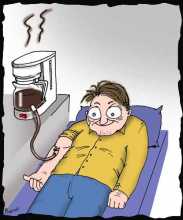I have an extreme coffee addiction, and I've had it for as long as I can remember. I started drinking coffee everyday regularly, and by my freshman year in high school, I needed one cup in the morning and one in the afternoon. Then, I drank mochas and other chocolaty drinks and gained quite a bit of weight, as well as an addiction.
In college, my addiction got worse, and I needed to top my several cups of black coffee off with an energy drink like Red Bull to stay awake in my afternoon classes. But I didn't think this was particularly unusual--all of my friends and everyone in the cafeteria, it seemed, needed coffee to be a functional, thinking creature.
Since graduation, a number of my friends have tried to cut back or cut down on their coffee intakes. I can't even imagine how this could be possible. On days when I don't have coffee immediately, I get a headache and a sort of fuzziness of focus in my brain. They are mildly unpleasant symptoms, sure, but who wants to give away an entire week to fight his or her coffee addiction?
Illustrated by the popularity of coffee shops and caffeine culture in the United States, most Americans have a similar problem to mine. And it's not just Americans--despite Starbucks' world dominance, America is only the 25th highest of coffee consuming countries, drinking about 4.2kg per capita in 2008. Compare that to the greatest world coffee consumer, Finland, a country which drinks 12.0 kg per capita.
That's not to say that most Americans aren't caffeinated in other ways. I would say that most Americans have an addiction to caffeine or some sort, whether its coffee, soda or tea. It's almost impossible to put in the long hours required of us without some sort of additive that keeps us awake. But I wonder, how did we start to classify caffeine, which is certainly a mood-enhancing drug, as something necessary, not dangerous?
Some say that coffee addiction is more the need for that jolt of energy. Rather, it is a ritualistic sort of experience--smelling, grinding, brewing, sitting, ordering, carrying. Doctors mostly classify it as a physical dependence, rather than an addiction, since we need it to function. I don't understand the difference. All I know is that there are so many factors that play into coffee addiction that it may be better classified as coffee culture addiction than anything else.
